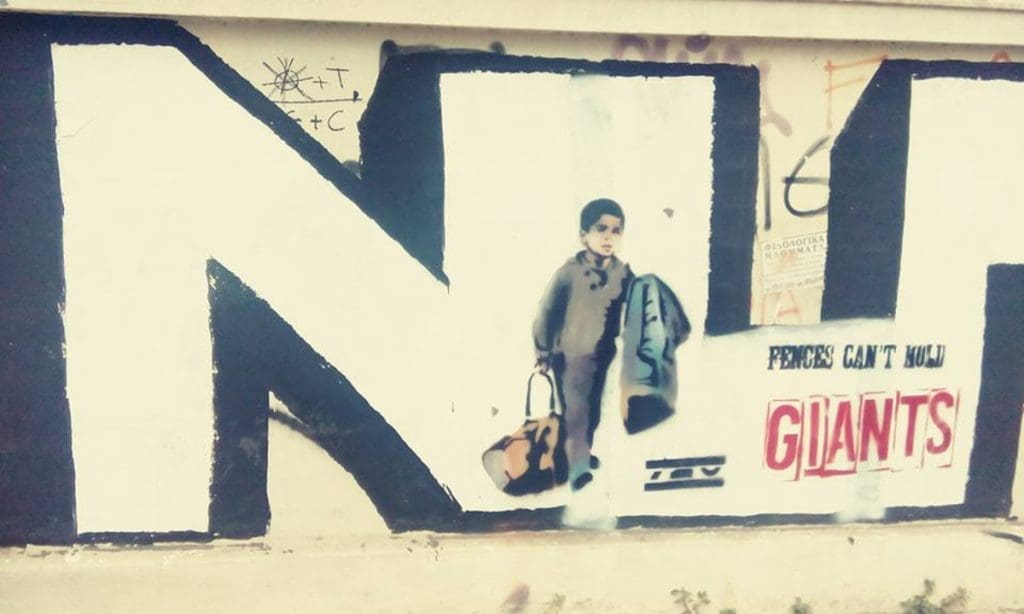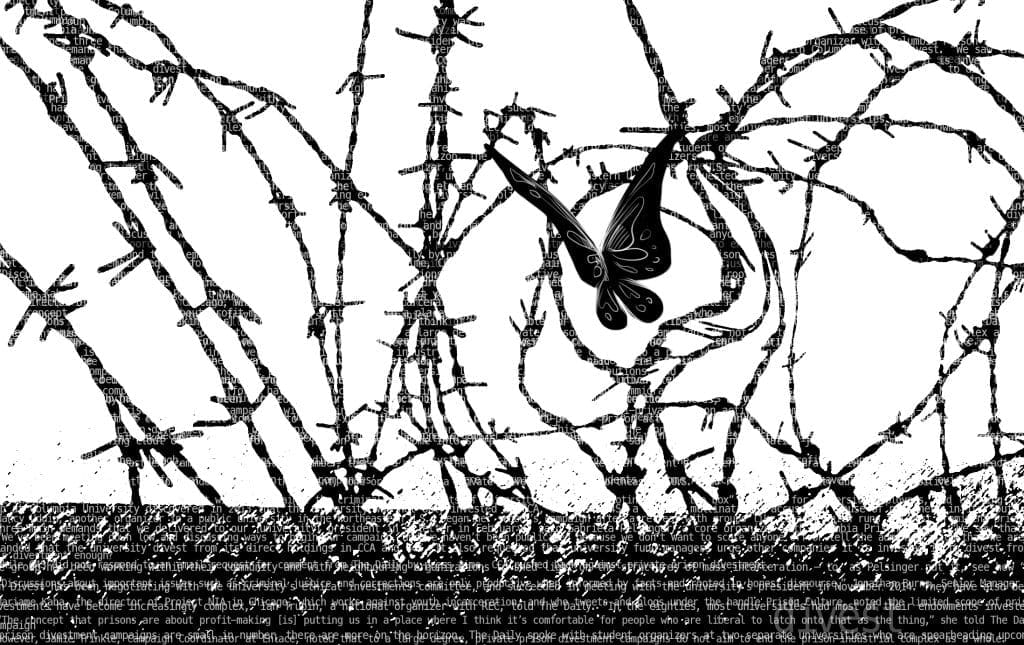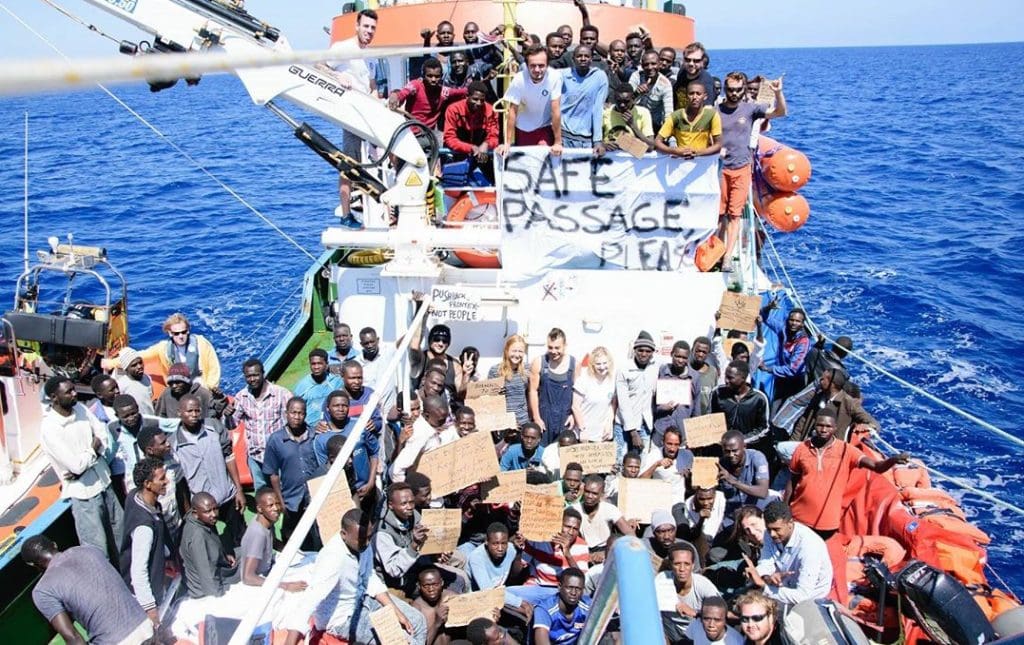Transcribed from the 31 August 2019 episode of This is Hell! Radio (Chicago) and printed with permission. Edited for space and readability. Listen to the whole episode:
Modern capitalism has an inherently violent origin. And it’s not just a violent origin, it’s a violent ongoing process by which it asserts its dominance.
Chuck Mertz: Late capitalism is having a real crisis at the US-Mexico border, and that crisis is caused by attempts at managing the crisis that is late capitalism. Here to give us his perspective on what he sees happening at the border, and in migrant detention centers that some are equating to concentration camps, writer and member of Atlanta’s Housing Justice League, Richard Hunsinger posted the article at Cosmonaut titled “Holocaust Capitalism.”
Welcome to This is Hell!, Richard.
Richard Hunsinger: Good morning.
CM: You write, “Today, the left has come to a common acceptance that the detention camps in which migrants are incarcerated are concentration camps. Concentration camps are defined as a place where large numbers of people—especially political prisoners or members of persecuted minorities—are deliberately imprisoned in a relatively small area with inadequate facilities, sometimes to provide forced labor or to await mass execution.”
Are the immigrants at the border, in your opinion—are they political prisoners? Is attempting to enter the United States a political act that turns potential immigrants into political prisoners?
RH: There is a component of political mediation potential in this situation here. But what I focus on is the overall geography of this movement of a nomadic proletarian population, as a relative surplus population produced by accumulation of capital in the imperial global production process.
CM: What do you mean by “surplus” population? I want to make sure that people understand the terms we’re going to be using in this conversation.
RH: Of course. I’m referring generally to Capital, Volume I, where Marx talks about the general law of capitalist accumulation. The greater the social wealth and functioning capital, and the greater the extent and energy of its growth, there’s also the greater absolute mass of the proletariat and the productivity of its labor—this creates a greater, larger “industrial reserve army,” or in this case a relative surplus population.
When we talk about how capital is created, we have to go to the origins of capitalism—the example that Marx details is the “primitive accumulation” process. The historical process he lays out is the English example of the enclosure of the commons. In order to take what people had access to—their means of subsistence, their proximity to their own means of production and means of social reproduction—there had to be a violent and brutal act of dispossessing them of their access to those things.
There’s been a lot of other good theoretical discussions that have advanced this theory. In Capital, Marx discusses this as being in the “prehistory” of capitalism. But developments in the twentieth and twenty-first centuries, coming from Rosa Luxemburg, David Harvey’s “accumulation by dispossession,” and Jackie Wang’s “racialized accumulation by dispossession” (in her book Carceral Capitalism), aimed to illustrate that this is actually an ongoing process: that in all cycles of capital’s accumulation there must occur this base displacement where the capitalists (or people who seek to appropriate capital or sources of value) must forcibly remove people from their access to other means of subsistence or their access to that which they are laboring on, in order to sell it back to them or initiate the productive consumption of their own means of subsistence.
CM: You write about how primitive accumulation is capitalism’s original sin. Can we in any way reform capitalism, if you will, without addressing that original sin of primitive accumulation?
RH: I don’t think we can. That is the initial point; we have to understand where it comes from. Modern capitalism has an inherently violent origin. It’s not just a violent origin, it’s a violent ongoing process by which it is able to assert its dominance. There must be a displacement that forms the base or infrastructure of capital accumulation.
CM: So how is capitalism’s violence taking place at the US-Mexico border?
RH: There is an interesting thing that I’ve been noticing. These things are being described as concentration camps—that’s a fact. But as this gets discussed, there seems to be an immediate conflation with fascism and parallels to Nazi Germany, when there are still distinct differences (although there is a clear parallel trajectory emerging that we should not take lightly). These camps are not really functioning or originating within a specific function of exterminationist logic. They actually fit quite neatly into the US’s reinvestment into its own means of production and its own normal capital flows.
There’s primitive accumulation, and other forms of accumulation by dispossession, which are facilitated by large regional hemisphere trade deals like NAFTA and USMCA (and like the new one that Trump is proposing) that are formed by multinational corporations protecting their interests in the region. “Free trade” only serves these large corporate entities: it further concentrates the capital of the entire hemisphere into fewer and fewer hands, and further alienates the labor populations in Latin American states from that which they are producing. And this is enforced by brutal intervention into the social, political, and economic affairs of Latin American states.
As there are more and more disparate climates of social, political, and economic instability, of course people are going to have to leave—especially as climate change is starting to affect their agricultural production. And now they are moving towards the core, where there are greater incentives offered for labor than in the periphery of this region.
This constantly produces this surplus population at the same time as domestic populations in the US are starting to experience a lot more downward social mobility. Income inequality gaps are widening, and that’s producing a fractured, reactive consciousness. Many political leaders are offering the solution of economic nationalism, seeking to focus on the lives of Americans First. The rich have relied on these cheaper laborer populations that the nomadic proletariat—migrants—have provided for them for a while. But now it’s starting to come in conflict with their immediate political goals and how they retain power domestically.
These camps are starting to erect themselves as a way to capture this relative surplus population that is the migrant, and still be able to profit off of that through the privatization mechanism. Seventy-two percent of incarcerated migrants are held in privately owned camps.
The left at large in America needs to start preparing to figure out where its politics can make a rupture with the procedural left and continue pushing the conversation towards a real politics that can confront capital and provide an alternative to ethno-nationalist capitalism.
CM: You write, “The old rallying cry of ‘American Jobs for American Workers’ is also a partisan talking point revealing the reactionary one-party state that has always dominated the US working class. In the case of the concentration camps on the border, then, we should not be fooled by either party’s posturing in addressing the matter.”
The reactionary one-party state that has always dominated the US working class? Why do you hear that in “American Jobs for American Workers?” How is pro-US-worker rhetoric reactionary?
RH: These are ways that the bourgeois state apparatus seeks to protect itself. This is another Marxist point, too. Under a capitalist society and a capitalist mode of production, the state is merely a dictatorship of the bourgeoisie. We’ve seen this many times between Republicans and Democrats: there are various surface-level differences in positions that parties hold, but they have roughly the same interests, and those are the interests of the rich, the capitalists within society.
I find it interesting that they are both gravitating towards economic nationalism, which is a term that the likes of Steve Bannon is very much a fan of. Among Democrats, Elizabeth Warren explicitly used this term in describing her approach to this. It’s a mechanism by which they can retain power over a domestic population by reinserting nationalistic patriotism and the sense of self and nationhood that is needed in order to sustain it.
The proletariat, the working class, really does not have a country.
CM: You write, “Social democratic policy prescriptions for capital brought the crises, and growing racial and class conflict is gaining traction on the right. For example, Tucker Carlson, on his Fox News show now engages with critiques of free market capitalism previously foreign to US conservatives, even inviting Angela Nagle, a so-called leftist cultural critic on as a guest. The manifesto of the El Paso shooter similarly criticizes the failures of American capitalism, while supporting social democratic forms such as universal basic income and universal healthcare to mitigate class conflict while also advocating for an increasingly popular ethno-nationalism.”
How vulnerable is democratic socialism to ethno-nationalism, even fascism? And how can social democrats keep fascism from co-opting social democracy?
RH: It’s quite vulnerable in the US, mostly because of the fact that we are a nation-state with deeply ingrained institutions of white supremacy. But social democracy is fundamentally reformist in a way that does not fully contest the origins of capital and capital accumulation, and it is, in its heart, a nationalist project.
Even if you get some of these reforms like Medicare for All or single-payer healthcare, you’re not fundamentally going to be able to address the elements coming into these coalitions that could be hostile to migrants. Angela Nagle wrote a piece called “The Left Case Against Open Borders,” which really forgoes any chance of internationalism or solidarity with the global proletariat.
As we see from things like the El Paso shooter manifesto or Tucker Carlson, the right is starting to make these same critiques of American capitalism and its excesses. That should be a big alarm ringing for any American leftist, because it shows where you are very vulnerable to co-optation. My nightmare is that Bernie Sanders gets elected and we still have migrant concentration camps and the border crisis. Fundamentally, if you become the representative of the capitalist state (even if you promise to be on the side of the workers and threaten the social, economic, and political stability of the state), because of your position in this political office you are going to be forced to defend the economic status quo. That will become defending the national project, which will play right into a fascist reaction as these problems are not able to be solved by US institutional politics.
To a degree, some of these reforms would be beneficial. I’m not going to turn my nose up at single-payer healthcare, I think it’s incredibly important. We should be looking for Medicare for All. But at the same time, as we exert this influence on the US institutional political sphere, and we see it starting to capture our interest, the left at large in America needs to start preparing to figure out where its politics can make a rupture with the procedural left and continue pushing the conversation towards a real politics that can confront capital and provide an alternative to ethno-nationalist capitalism.
CM: You mention how the nationalist project must conceal a reality in order to sustain its fantasy. What must the nationalist conceal in order to sustain its fantasy?
RH: The nationalist project, in order to sustain its fantasy, needs to create some sort of Other as an object, a symbol for the national subject by which it can see itself, in that it is not this Other. That’s drawing on some psychoanalysis a little bit. But it needs to disengage people’s understanding of its international economic sympathies and the ties that it has with social modes of organization, like kinship and citizenry. It needs to do that in order to make people believe that America is a self-sustaining, stand-alone power in the world when in reality we are entirely reliant upon the violent extraction of resources on a global scale. We are an imperial power. We have asserted dominion over this hemisphere, and done it ruthlessly and violently for centuries now, ever since the Monroe Doctrine. We are only able to see ourselves as a citizenry if we are able to see ourselves separate from those that we can point to and say, “You do not belong here.”
CM: You write, “Forming among the anti-corporate strains of US politics is an understanding of the mutual share of responsibility that the Republicans and the Democrats possess in their inability to counter the tide of corporate influence, instead taking part in the full transformation of the state into a model of realization for capital.”
What happens to a government like the United States, a representative democracy, when it becomes a model of realization for capital? And what would you say to someone who argues it always was, that neoliberalism and today’s age of late capitalism hasn’t changed anything?
RH: I would say they are right, to an extent. When I mention this transformation, I’m talking about a continuation and further realization of a process that is tied to the history of the origins of industrial capitalism. Capitalism has always proceeded in its development through the state form, and the state has always been a very important apparatus for the continuation of capitalism’s development. The state, under what we could call a dictatorship of the bourgeoisie, becomes the apparatus where a national bourgeoisie is able to assert its interests and hold a monopoly on the assertion of its interest through the use of legitimized force or violence.
Organizing outside of American nationalism means organizing with an increasingly international consciousness regarding the working class and proletariat on a global scale, and finding ties with projects and efforts that are happening throughout the world.
Privatization is a model of realization for capital, and in the advent of neoliberalism, there has been a ramping up of this process—while the curtain has come down on how it functions. It’s a natural outgrowth of capitalist development. This would be the end conclusion. We see it very clearly in the concentration camps: so many migrants who are detained and incarcerated there are in these private camps which channel funding through government contracts. CoreCivic (formerly the Corrections Corporation of America) and Geo Group earned a combined $985 million from government contracts alone in 2017. And there are other parties at play too. Privatized within the camps are all the various functions which they’re obligated to by the contract to provide: healthcare, telephone services, shampoo products that have to be produced.
Banks invest finance capital into them. Companies run their products through them. Tech companies run data products that they’re testing out and developing through them. And the corporations that run these companies are using the relative surplus population—the nomadic proletariat, the migrants who are here—as a channel through which to further realize capital.
CM: Am I going too far or does this sound a lot like the antebellum financialization of slavery? They were selling on Wall Street—they were commodifying slaves. It was possible to make financial investments in slave trading on Wall Street. I was just thinking about how there’s a price put on each bed and on each person who is put into these facilities, a price agreed upon by congress that these private institutions get.
It just sounds so much like pricing human bodies. It just sounds so much like slavery.
RH: Oh, it entirely is. I’ve read elsewhere that some of these migrants are actually induced into forced production of some things. I don’t know if it’s at a significant enough level, yet, to say that’s the sole intent or a significant source of value. But no, it sounds very analogous.
CM: You write, “Left projects organizing support on a grassroots level to support these reformist initiatives must remain conscious of the limitations of the nationalist project. Whether there is a claim to reject American nationalism or not, this is the sphere of political action these projects occupy.”
Is grassroots organizing an exercise in American nationalism? And where can those who want systemic changes organize outside of American nationalism?
RH: Organizing outside of American nationalism means organizing with an increasingly international consciousness regarding the working class and proletariat on a global scale, and finding ties with projects and efforts that are happening throughout the world, and developing that consciousness with everyone you’re organizing with. I wouldn’t say that grassroots organizing work is inherently an American nationalist project. But organizing for reformist initiatives such as Medicare for All—state reforms—constitutes acting within a nationalist project.
It’s about further developing the internationalism that is coming out and developing very well on the left. Even the DSA is becoming more conscious of this, but it’s important to continue to reassert this and figure out how to start forging ties and real solidarity between our domestic proletariat and the nomadic proletariat and migrants who are incarcerated here, to build coalitions among these groups. The only way to abolish the border here is to continue to push that there really is materially no border except that which is enforced by the state.
CM: Can the United States de-neoliberalize? Can the world? More importantly, how much would that solve the current crises we are experiencing under late capitalism?
RH: While neoliberalism is a useful term to better characterize the more recent epoch of capitalism that we are experiencing, we need to be careful in making sure we’re not asserting it as a distinct mode of production or type of society. We have to be very clear that what we are experiencing now, what we are living in, is the product of capitalist society continuing to assert itself and the social relations that it needs in order to constantly reproduce itself. It is a constantly homogenizing process of social relations that creates capital and form it on a global level.
I don’t know about solving the current crises—we have to directly confront them, and the solutions will only present themselves through action and confrontation.
CM: Are the detention centers, then, an outcome of poor crisis management during late capitalism? Could the crisis that is late capitalism be managed better? Or is any crisis management in late capitalism going to have harmful effects?
RH: I wouldn’t say it’s poor crisis management, because it makes perfect sense. The number of concentration camps in United States history, the forcible detention of ethnic groups—it’s very much a part of US history, it’s baked in. It’s not really an abnormal practice. And it’s not an abnormal practice of large states on a global scale. This happens wherever they’re starting to have “immigration problems” that they cannot solve.
The working class, the proletariat has no country: it is a universally produced subject by capital accumulation. When we talk about that base or infrastructure, and capital accumulation being a displacement, we are also talking about this displacement creating a continually larger surplus population. In Capital, Volume I, Marx says: “The same causes which develop the expansive power of capital also develop the labor at its disposal. The relative mass of the industrial reserve army thus increases with the potential energy of wealth. But the greater this reserve army in proportion to the active labor army, the greater is the mass of a consolidated surplus population whose misery is in inverse ratio to the amount of torture it has to undergo in the form of labor. The more extensive the pauperized sections of the working class and the industrial reserve army, the greater is official pauperism. This is the absolute general law of capitalist accumulation.”
As capital accumulates, we will constantly be producing a greater and ever-larger immiserated, dispossessed proletariat on a global scale, and that becomes the condition for who must be organized, what must happen, and how to combat it.
CM: Is what we are seeing, then, at the US-Mexico border in any sense an uprising, if you will, against capitalism’s dependence upon the misery of others in order for it to succeed? Is this the revolution against capitalism’s utter dependence upon the lowest-wage workers so the richest can accumulate wealth?
RH: It’s maybe not so much a conscious revolution, but it is a result of the ongoing contradiction between the free movement of capital across borders and the similarly restricted movement of labor populations. This is an immediate global contradiction which this displays perfectly. It is a real picture of that which is not adding up. It is the disengagement of a nation’s or a metropolitan society’s organizations of kinship and citizenship—it is disengaging with the international economic syntheses that constitute it.
What we’re seeing is a global revolution against the concept of nationalism, and that in turn is fueling the nationalist reaction against it—which is what plays into the fascist reaction.
This contradiction is producing an irrationality that moves from a conscious and sensible investment in society’s means of self-production into investments in society’s means of self-destruction. This is where we start to see fascism really forming.
CM: Is any uprising that happens today about the fact that capital has more freedom than people? And if that is the case, to what extent do we actually realize that within, say, the mainstream political debate—does everybody have a sense of this? That capital has more freedom than people and we’re rising up against it? Or are we utterly unaware of it?
RH: A lot of the American left is very aware of this. This contradiction is discussed very openly by people who pay attention to the migrant camp situation. But the American public at large is not very conscious. We’re not going to see this discussion happening in the US institutional political sphere, which is moving more and more towards fascism: in the US institutional political sphere and within the state establishment and apparatus, there are varying levels of an unconscious emergence of fascism. Within rightwing spheres, there are certainly very conscious fascists, but they have yet to fully seize power.
In this moment we are seeing the irrationality of this contradiction—global free movement of capital but restricted movement of labor. An imperialist nation that has relied upon this nomadic proletariat for cheap labor for so long is starting to reject it, incarcerate it, and turn back towards its domestic labor population (despite the fact that it’s been de-industrializing and de-skilling this domestic labor population for decades). This is producing an irrationality that moves from a conscious and sensible investment in society’s means of self-production into investments in society’s means of self-destruction. This is where we start to see fascism really forming.
I like following Paul Virilio on Deleuze and Guattari’s discussion of fascism and micropolitics as the emergence of the “suicidal state.”
CM: You write, “Considering the origin of these displacements that have created the nomadic proletariat, we must take into account the long history of US military and political intervention in the affairs of Latin American states which lay the foundation for current waves of migration. Latin American intervention, the intentional and violent arrangements of political power in those countries for the benefit of US interests, is a history with a clear end goal, and that has been the dominance over the claim to ownership of surplus value created in production by multinational corporations that have in turn enforced monocultural agricultural production, superexploitation, and further alienation of those laborers from that which they produce.”
In order for us to address the border and the problems that people are facing at the US-Mexico border right now, do we have to confront American exceptionalism and innocence? Does confronting the issues at the border mean admitting that the American myth is wrong?
RH: Yeah, totally. American exceptionalism needs to be dismantled in the hearts and minds of the US population. We need to be constantly challenging and uncovering efforts we see to destabilize Latin American countries for the benefit of US interests. A development of this consciousness was seen this year, in the very easy push against what was quite obviously the US backing a very unpopular coup attempt in Venezuela, with clear economic interests at play. Within the last half century there have been fifty-plus US interventions in Latin American states, and various coups supported by the United States in those countries. It’s really important to constantly be challenging the narratives that the US has of itself.
CM: You write, “The transition to fascism is seamless because the progression is inherent in capital’s crisis in the US, where the capitalist mode of production is so highly developed, with heavily ingrained institutions of white supremacy. Capital’s tornado reaches an intensity and magnitude of crisis to make a qualitative shift to the black hole of fascism’s suicidal state. The movement is not yet complete, and we may yet have time to prevent a new American Holocaust. Its death will only be real if we act.”
What would a new American Holocaust look like?
RH: I do not want to picture that, or envision it. When we talk about the Holocaust with this in relation to it, we need to understand that the exterminationist logic that emerged out of Nazi Germany was part of a specific set of material conditions that we are closer to replicating than we are comfortable admitting. People are already dying and being murdered by guards in these camps. People are already being shot and killed by CBP on the border before they even get into these camps. And we’ve got rightwingers and people all over the place calling for their violent expulsion from the country.
We often view the Holocaust of Nazi Germany as some singular historical event, and I think we’re missing the ways in which it is quite reproducible by other societies. The United States itself, in its own history of settler-colonialism and Manifest Destiny, has a logic of extermination in the core of how it addresses crises. We’re seeing it turn into this very seamlessly because part of this reaction is the US reverting back to the violent reassertion of its power.
My nightmare is that if Bernie Sanders gets elected and there is more and more support for these social democratic reforms and the idea of socialism, but things don’t improve—that paves the way for an even more intense fascist reaction. If people embrace socialism only on a national scale but reject the more progressive tendencies of a socialist movement, that perfectly paves the way for an actual national socialist to emerge and for the exterminationism of the US to accelerate.
I am deeply worried about this situation. I don’t really have a lot of faith in the US institutional political sphere to address this. I think a lot about Barack Obama’s promise back in 2008 to close Gitmo, and that is still open. It’s very much outside the hands of whoever you elect as the head of state. And it’s honestly disgusting to me that they’re all using it as a talking point right now on the debate stage. I just can’t.
CM: Richard, I really appreciate you being on the show this week. Thank you so much.
RH: Thank you for having me, it’s been a pleasure.





